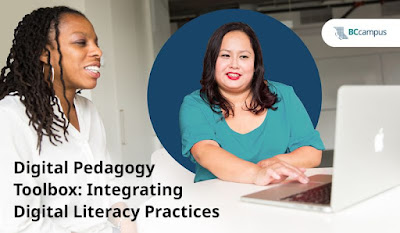The
B.C. Digital Literacy Framework is part of the
B.C. Digital Learning Strategy developed by the Digital Learning Advisory Committee, a collaboration between the Ministry of Post-Secondary Education and Future Skills and the post-secondary system. The B.C. Digital Literacy Framework was developed to enhance digital literacy knowledge, skills, and abilities across post-secondary communities. The framework includes eight thematic competencies within digital literacy: ethical and legal, technology, information literacy, digital scholarship, communication and collaboration, creation and curation, digital well-being, and community-based learning. The course aimed to generate awareness about the framework and empower educators to enhance digital literacy skills in their students.
Given that I have spent over two decades working in the areas of competency development and assessment, the language of competencies comes somewhat easily to me. But I know that understanding the language and vocabulary of a competency framework is the first step in imagining how to integrate and apply the framework into our working lives. And that is perhaps the greatest challenge with most competency frameworks; they sound complex and can be intimidating to read.
Throughout the course, we engaged in thoughtful discussions, delving into the nuances of digital literacy and its significance in our teaching practices. We discussed what digital literacy means to each of us and how it can be weaved and integrated into our teaching practice.
The thing that's unique about digital competencies is that they apply to all of us. Digital competencies are not specific to any sector or an occupation. And they are no longer a unique requirement of knowledge work. Digital competencies are essential and non negotiable for all of us to learn, work and thrive in today's digital world.
In 1997, when
Paul Gilster coined the term “digital literacy”, he said
"digital literacy is about “mastering ideas, not [computer] keystrokes”.I believe that Digital Literacy is…
- a journey; not a destination
- dynamic; not static
- core to learning; not a distraction
- a mindset; not a checklist
And in order to integrate digital literacy, we must...
- Start with the learning outcomes and identify challenges/barriers that can be reduced or removed using digital literacy
- Use “Plus One” thinking to make small incremental changes and layer and weave digital literacies into everyday learning/working
- Model digital literacy skills and share experiences & challenges
- Build policies, supports, and technology infrastructure to advance digital competencies
Ultimately, taking a thoughtful and phased approach to integrating a digital competency framework will likely yield the best results, ensuring that both educators and learners can adapt to the digital landscape in a constructive and sustainable manner.


